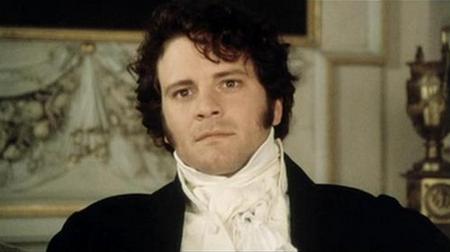
Pride and Prejudice is Jane Austen’s most popular if not most adapted novel, and its famous hero Mr. Darcy has been interpreted in many different ways. There have been several excellent period adaptations of Pride and Prejudice which present Darcy’s character differently, particularly Fay Weldon’s 1980 and Andrew Davies 1995 versions. These two adaptations master the characters of Austen’s work which is so important. Weldon’s perhaps captures it slightly better than Davies’ because she is not as focused on Darcy as he is. Davies’s tries to bring Darcy’s side of the story forward so that the viewer sympathizes with him and sees what a good character he is long before Elizabeth feels the same way. This goes against the feeling of the novel because the reader is guided by Elizabeth’s thoughts for the majority of the novel rather than understanding Darcy’s.
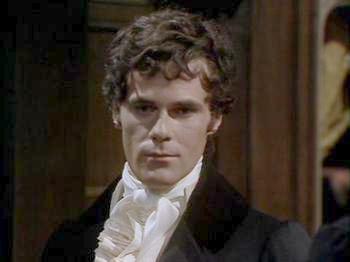
Pride and Prejudice‘s popularity has been growing over the years bringing more people to Jane Austen as well. Many of the adaptations are wonderful but the viewer has to keep in mind that it is the novel that is at the heart of the film. They should not depart drastically. Pride and Prejudice can be adapted faithfully to the novel while bringing the characters to life. It is only a matter of the writer and director doing it, some have and some have not.
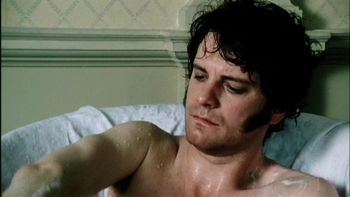
Davies’ adaptation might as well be called “Darcy’s Story” at times. Darcy is a great character in the novel and yet the story is not about him. It is about Elizabeth, her relationship with her family, and then Darcy. In Davies screenplay Darcy’s point of view is given to the viewer to show us his softer side, the side Elizabeth can’t see immediately but the viewer can. In the novel Darcy is suppose to be constantly looking at Elizabeth and these looks can explain a lot about his character. Andrew Davies explained,
“One of the first things that struck me about Pride and Prejudice is that the central motor which drives the story forward is Darcy’s sexual attraction to Elizabeth. He doesn’t particularly like her, he’s appalled by the rest of her family and he fights desperately against this attraction.” (BBC website)
In Davies’ version these looks are almost always of admiration and approbation, yet in other versions it is not easy to tell why Darcy is looking at Elizabeth. David Rintoul’s Darcy in the 1980 Weldon adaptation hides his facial expressions better than Firth’s 1995 Darcy does. Yet, perhaps Firth is meaning to wear emotions on his face (though this is not very Darcy like) to bring him more to life and to make him more agreeable. One positive aspect of Darcy in this adaptation is that he practically has to relearn everything he thought he knew about women to get Elizabeth. He has been use to objectifying them but when Elizabeth comes along, she sparks a change in him. The problem is that this is a little too fanciful. Darcy does change and for the better with Elizabeth’s help, but as Elizabeth points out to herself in the end of the novel “She remembered that he had yet to learn to be laughed at, and it was rather too early to begin“. He is not a completely changed creature and Elizabeth knows this. The viewer, like the reader should love Darcy in the end for the reasons Elizabeth does. That he is a gracious, kind, thoughtful man and he is better than we ever believed possible from their first encounter; yet for this to be successful the viewer cannot be idolizing over Darcy for three quarters of the film which is what most viewers are doing in this version.

Davies’ adaptation is an almost faithful reworking of the novel for a modern and sexual audience. Darcy’s sex appeal cannot be over looked and is overplayed by Firth. In the novel Darcy’s character is what makes him a fine man, not his body. The story shifts focus in this adaptation to Darcy which though it seems faithful, I think it undermines Austen’s original story because viewers can feel more sympathy for Darcy than they do for Elizabeth.
“Although Jane Austen’s book was told very much from Elizabeth’s point of view, Andrew decided to make his version very much Darcy’s story as well. He did this partly by inserting new scenes which showed Darcy outside the stiff social events, allowing the viewer to see more of the real man” (BBC website).
The opening of film shows what the emphasis will be about as Davies opens his film with Darcy and Bingley riding on horseback, rather than begining with one of the most famous line in the English language, “It is a truth universally acknowledged that a single man in possession of a good fortune must be in want of a wife“. Instead, Elizabeth is given these lines a few scenes in, but by starting with Darcy, Davies’ is perhaps showing where his focus will be throughout the production, on Darcy rather than on Elizabeth.
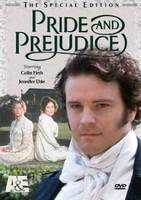
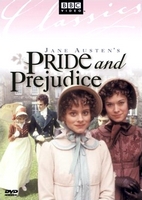
As much as I love the 1995 adaptation written by Andrew Davies, I really dislike how Darcy takes the center stage at times. Even when looking at the DVD cover compared with the 1980 Fay Weldon version, the 1995 cover includes Colin Firth as Darcy front and center with Elizabeth only in the background with Jane, while on my 1980 DVD cover it has Elizabeth and Jane in the front and Darcy only in the background with Elizabeth. I know these might be merely marketing issues that I am raising but it is worth thinking about because if the focus of the adaptation changes too much, then what is it saying about those who are watching it. I just get tired of the Darcy mania. I sometimes feel that I am on a soap box shouting about him so I don’t want people to think that I don’t like him in the end. I DO. Who couldn’t? But I just think that readers and viewers of the movies should remember the original story in mind because that is what is so amazing, not some adaptation of it. Ok enough soap box… what does everyone else think?
Until next week,
Virginia Claire
Virginia Claire, our Austen at Large roving reporter is a college student studying English literature and history who just returned from her time studying abroad in Bath England and working as an intern at the Jane Austen Centre. She is the Regional Coordinator of JASNA North Carolina and a lifelong Janeite. She will be sharing her thoughts on all things Austen this semester and remembering her travels in Austenland.
Sometimes an adaption helps the book and I do like Davies minor changes. Nice job on your essay by the way!
LikeLike
You make some excellent points. I’m still uncomfortable with the Darcy mania. Overall, I think Davies created a version with which the many people who might be intimidated by Austen could feel comfortable – and this in turn, lead them to read the book.
But his P&P adaptation highlights a problem I have with quite of few of his screenplays – he bolsters up a (usually male) character to the point where they seem just as (or even more) important than the protagonist. Happily, everything comes together well in P&P (unlike his horrible Fanny Hill adaptation), and it is still one of my favorite films/series.
Thank you for the wonderful essay.
LikeLike
I agree on changes in Davies’s version. IMO, they complety destroy the principal message of the story- of wrong first impressions. By not letting viewiers experience prejudice to Darcy, Davies deprives them of that important lesson. He makes extra effort to ensure that nobody misses that Darcy is decent human being- which is quite insulting for us.
He also destroys the story this way by killing suspense. We know that Darcy is on his way to Pemberley, when Lizzy is there- and more importantly, we know that he still harbours feelings for her. And showing from the beginning Darcy involved in helping Lydia is peak of bad storytelling.
Futhermore, we are presented with sleazy, unatractive Wockham, because we cannot doubt who is the hero. And Darcy’s story, unlike Wickham’s is supported be flashbacks.
And I really loathe “wet-shirt scene”.
LikeLike
Neoma makes a good point about Wickham’s portrayal. He needs to be convincing (and attractive!) in order for us to share (or at least sympathize with) Elizabeth’s doubts about/dislike of Darcy.
LikeLike
I cannot agree, perhaps because I’ve been an avid fan of Davies’ 1995 version my entire life. My earliest memories are of watching it with my mom.
It is by far the most faithful to the novel of any version I’ve ever seen. I think that Colin Firth made an absolutely perfect Darcy, not necessarily because he is an attractive person (remember, Darcy was SUPPOSED to be a handsome man) but because he embodies the character.
I don’t think there is undue emphasis put on Darcy; it is not HIS story, and I’m actually of the opinion that there is a good balance in the movie between his story and Elizabeth’s. I’ve never been on the opinion that Darcy has overshadowed Elizabeth in the story; there was never a doubt as to who the “star” of the story was.
I think that everything comes together quite well in this version of P&P, and that no one could ever do it better (as evidenced by the most recent adaption of the novel)
I think that the motivation of the minor changes made in this adaption, as Emily K stated earlier, have made the novel less intimidating to people, and encouraged people to go out and read it.
Anyway, thank you for a very interesting essay.
LikeLike
I disagree that this version is the most faithful-the 1980 made fewer changes. What is more, changes made by Davies are sometimes totally without any basis. I also disagree that’s impossible to make better- i think it would be very restraining to stop making new adaptations.
LikeLike
Thank you for the well-thought out essay, Virginia. I’ve always preferred David Rintoul’s Darcy to Collin Firth’s (and not just because I don’t think CF is attractive) because of what you pointed out: he embodies Darcy as he was in the novel better than the way he was interpreted in the Andrew Davies adaptation. And Davies has a habit of making unexplainable changes to Austen’s stories whenever he adapts them, which can, at times, be frustrating.
That being said, though, I do still think that the 1995 film is a better overall piece of filmmaking, even if I do wish I could transplant David Rintoul’s Darcy into it.
LikeLike
Like Kaye, I am a Rintoul fan. I adore the 1995 version too, but will always be partial to the 1980 Weldon adaption that influenced my appreciation of Austen.
I do understand your frusteration Virginia Claire over Davies shift toward Mr. Darcy. It does change the story that Austen originally conceived. The book is definetley from Elizabeth’s perspective. I do not mind seeing more of him in the story or understanding his motivations a bit more. It is just another interpretation of Austen’s view and I did not find it offense. As long as you read the book and know the difference, that is what counts!
Cheers, LA
LikeLike
IMO, the problem with Davies adaptaption is exactly that for many people it replaced book. For instance, I heard many times claims that Lizzy could only marry for love- which was written by Davies, not Jane Austen.
LikeLike
I think both the 1980 and 1995 adaptations have equal changes from the book. The 1980 changes may not be as obvious, but are certainly there. Here are some examples. They make the Collinses have an instrument in their parsonage. The book clearly states that they do not. There’s no Maria on the trip to Hunsford. There are several lines near the beginning that the book makes one character say and these lines are given to other characters. Lets not forget the Elizabeth’s five-mile run to Pemberley when she finds out about Lydia running away. Mary doesn’t do her singing at the Netherfield Ball. She does it earlier and Mrs. Bennet corrects her instead of Mr. Bennet. Those are just some of the examples.
The 1995 scenes with Mr. Darcy don’t bother me because I feel like they are acting out what is in Mr. Darcy’s head. The novel has several places where we see into Mr. Darcy’s thoughts. Unless they make him think these things out loud with a voice over we won’t get those thought lines from the book. In most all of those scenes he has not lines to say, just facial expressions to let one know what he’s thinking.
LikeLike
Personally I was dismayed with the 1980 adaptation exactly because it has so many changes I felt someone was forcing their own interpretation of the novel on me. Davies was much more subtle.
I’m not happy with some changes Davies made, but almost none of them refer to Darcy. Rather I dislike the too sympathetic portrayals of Mr. Bennet and Charlotte, and the caricatures of Mr. Collins and Mrs. Bennet, and other alterations like that.
However, Davies has Darcy snub the Bennets in the middle of introductions, and that makes him far more rude than he ever was in the novel. I don’t like that he cut the Netherfield dialogues either. But I don’t think that there’s too much of Darcy in the series in general.
In one of his interviews Colin Firth said that he appeared only in 12% of the scenes, and I believe it to be true. On the other hand, in the novel Darcy appears in nearly every chapter, because even if he’s not physically present Elizabeth keeps thinking about him and brings him in her thoughts and conversations. I think there are only 7 chapters in which he isn’t mentioned, so in fact there’s more of him in the novel than in the series.
I didn’t mind the added scenes because they are such typical things a Regency gentleman would do. It’s rather obvious that he’d fence, swim or go to university. Yet I would love to have there more of the original instead.
However, I think we read the novel with different feelings to begin with. I too read it years before watching any adaptation, but I never had any doubts that Darcy was a good man, I shook my head over the silly Elizabeth who believed Wickham (I thought it was obvious that he was lying), and I pitied Darcy when Elizabeth rejected him. I did see her point, but I never thought that she was right, although I didn’t yet know the extent of her blindness. Austen gave us many perspectives throughout the novel, not only Lizzy’s, and it was up to reader whether to follow Lizzy’s judgement or keep one’s own. I’d say that Austen laughs at Lizzy too much like for a character that is supposed to know better.
LikeLike
If Davies had adhered to Austen’s novel more closely, wouldn’t Mr. Darcy be in danger of shifting from one type of man to another without any real development?
LikeLike
It was a pleasure to read your essay; I agree with so much of what you say. The Davies version is very enjoyable but also rather patronising to the audience, spelling out things that he thinks we won’t otherwise understand; Darcy’s feelings especially. Firth’s Darcy is just too soft and cuddly! For me the 1980 version is far superior. Yes, it lacks the opulent high budget appearance of the 1995 production but David Rintoul’s noble, reserved Darcy is perfect. The gradual character change in Garvie’s Lizzy is beautifully done too.
LikeLike
The 1995 version is superior. I’m watching the 1980 version. While I found it entertaining, I noticed that it is even less faithful to Austen’s novel than the 1995 miniseries. Fay Wedon’s script did some judicious trimming.
LikeLike